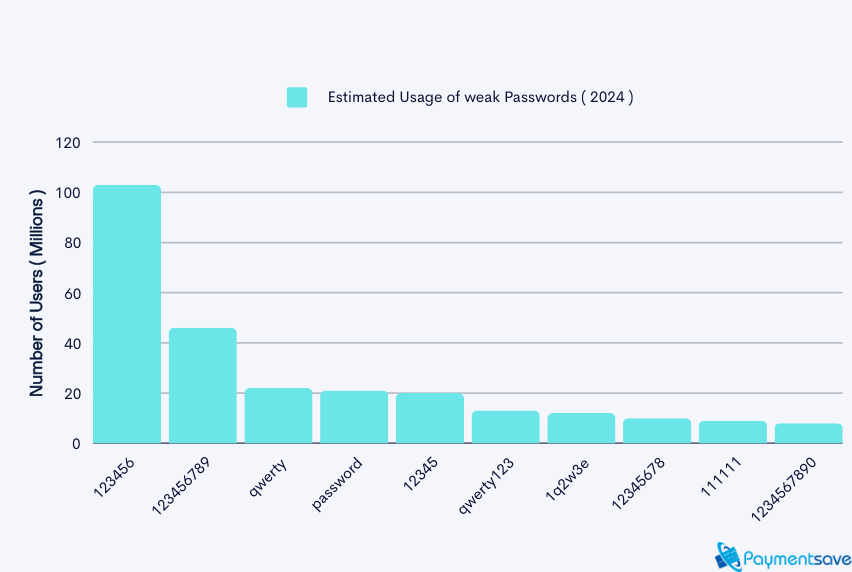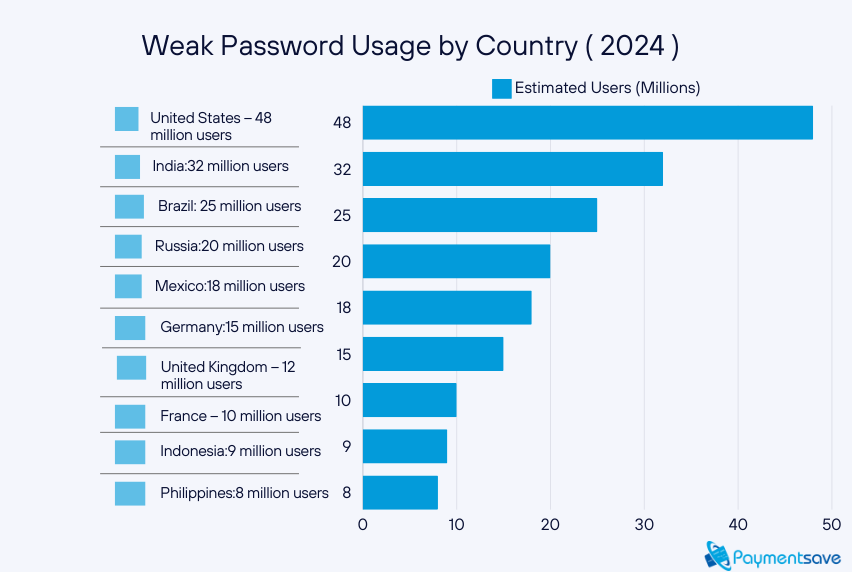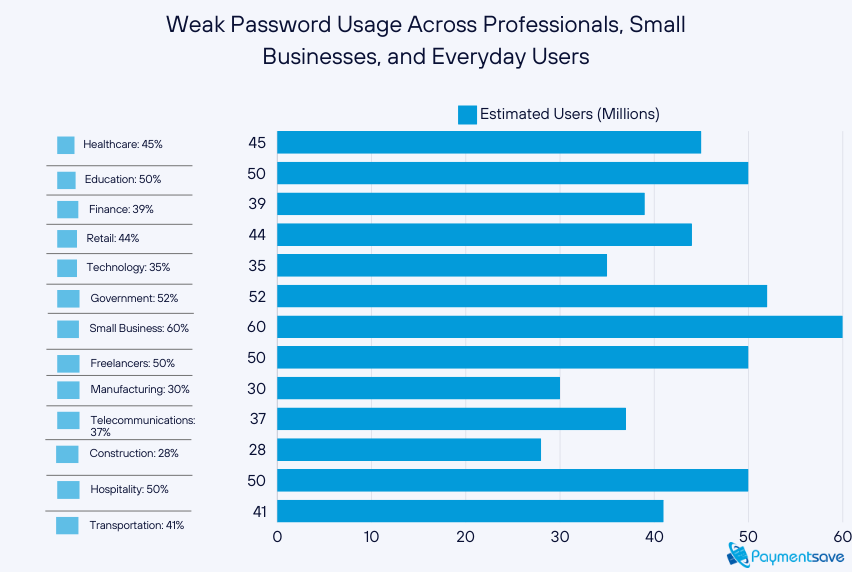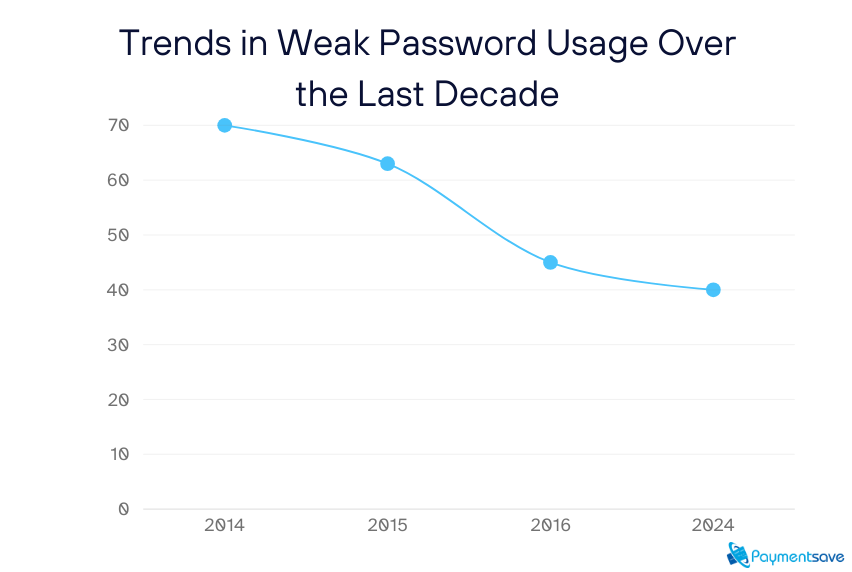
10 Hacked Passwords
Password Security Analysis:
Top 10 Hacked Passwords & Insights on 264M+ Users
In 2024, password security is still a big problem. Many users, over 264 million, are using weak passwords that are easy to guess, which puts their online accounts at risk.
Even though people are becoming more aware of cybersecurity, simple passwords like “123456” and “password” remain some of the most hacked. This shows that there is a real need for better security habits. This report looks at the top 10 most commonly hacked passwords and shows how different age groups, jobs, and countries use them.
More people are starting to use password managers and multi-factor authentication (MFA) to make their accounts safer. In fact, the number of users with weak passwords has dropped from 70% in 2014 to 45% in 2024. However, many people still choose simple passwords because they are easier to remember, which highlights the need for ongoing education about password security.
This analysis provides helpful insights and practical solutions to improve password security in 2024. It aims to guide users on how to protect their accounts better. As we explore these findings, we will also look at the changing challenges and solutions related to password security.
Methodology of Our Study
This study used both numbers and personal insights to look at password security practices in 2024:
Data Collection: We gathered information from reliable sources, like NordPass, SplashData, and the Verizon Data Breach Investigations Report (DBIR), to find common hacked passwords and trends. We also surveyed users about their password habits based on age, job, and location.
Trend Analysis: We examined historical data to see how password usage has changed over the last ten years, especially regarding password managers and multi-factor authentication.
Visualizations: We created charts and graphs to show important trends and insights clearly.
Expert Insights: We included advice from cybersecurity experts to provide context and recommendations for better password security.
Recommendations: Based on our findings, we suggested practical tips and tools to help improve password security.
By using these methods, the study offers a clear picture of password security in 2024, pointing out challenges and solutions for users.
Key Takeaways
- Weak Passwords are Still Common: Over 264 million users rely on easily guessable passwords, despite increased awareness of cybersecurity.
- Top 10 Hacked Passwords: Simple passwords like “123456” and “password” are among the most hacked, leaving accounts vulnerable.
- Demographics Matter: Weak password usage varies by age, profession, and country, highlighting the need for targeted education.
- Security Tools Are Important: The use of password managers and multi-factor authentication (MFA) is rising, helping users create stronger passwords and reduce breaches.
- Improvement Over Time: The percentage of users with weak passwords has dropped from 70% in 2014 to 45% in 2024, showing progress in password security awareness.
- Continuous Improvement Needed: Many users still prefer simple passwords for convenience, emphasizing the need for ongoing education on security best practices.
- Take Action: Using password managers, enabling MFA, regularly updating passwords, and creating strong passwords are practical steps to enhance online security.

Top 10 Hacked Passwords & Insights on 264M+ Users

In 2024, password security remains a major challenge despite growing awareness around cybersecurity. Weak and easily guessable passwords continue to be a leading cause of data breaches. With over 264 million users still relying on insecure passwords, hackers are exploiting this vulnerability through brute-force attacks and credential stuffing, leading to serious security breaches.
Weak passwords are used across a wide range of demographics, industries, and sectors, making it easy for cybercriminals to access personal and sensitive information. Despite advancements in password management tools and multi-factor authentication (MFA), many users and businesses fail to adopt strong password security practices. This report provides data-driven insights into the most common hacked passwords, the categories of people using them, and actionable solutions to enhance password security in 2024.
In 2024, some passwords are very easy for hackers to guess. According to reports from NordPass and SplashData, these are the 10 most commonly hacked passwords used by people around the world:
- 123456
- 123456789
- qwerty
- password
- 12345
- qwerty123
- 1q2w3e
- 12345678
- 111111
- 1234567890
These passwords are weak because they are too simple and easy to guess. Many people use them because they are easy to remember, but this also makes them unsafe.
The combined usage of these 10 weak passwords exceeds 264 million users globally.
Password | Estimated Users (Millions) |
123456 | 103 |
123456789 | 46 |
qwerty | 22 |
password | 21 |
12345 | 20 |
qwerty123 | 13 |
1q2w3e | 12 |
12345678 | 10 |
111111 | 9 |
1234567890 | 8 |
Why These Passwords Are Unsafe:
Passwords like “123456” and “password” are very popular, so hackers can guess them quickly. People use these passwords because they are easy to remember, but that makes them unsafe. When you use simple passwords, it’s easier for hackers to break into your accounts and steal your information.
Weak Password Usage Across Countries, Ages, Professions & Industries
When we look closely at the people using weak passwords, we see that different groups and industries have different habits. Weak passwords are used by people of all ages, in various jobs, and from different countries. This section will show how common passwords are used by specific categories like countries, age groups, and professions. Understanding these patterns helps us see who is most at risk and why.
Which Countries Use the Weakest Passwords? Top 10 Nations at Risk

Weak password usage varies significantly across countries, with some regions having a higher concentration of users relying on simple, easily guessable passwords. Based on data from NordPass and the Verizon Data Breach Investigations Report (DBIR), here are the 10 countries where weak passwords are most commonly used:
- United States – 48 million users
- India – 32 million users
- Brazil – 25 million users
- Russia – 20 million users
- Mexico – 18 million users
- Germany – 15 million users
- United Kingdom – 12 million users
- France – 10 million users
- Indonesia – 9 million users
- Philippines – 8 million users
These countries have a large number of internet users, and many rely on simple passwords such as “123456” or “password.” This makes them prime targets for hackers, who can use common password lists to easily break into accounts.
How Different Age Groups Use Weak Passwords: Who's Most at Risk?

People of all ages use weak passwords, but how they choose these passwords can vary depending on their age. Let’s look at how weak password usage is different across three age groups:
#18-24 Years Old
Many young people in this group often use weak passwords because they want something quick and easy to remember. They may not always think about the risks of hacking. This group uses the internet a lot, especially for social media, so they may repeat the same password on different sites.
#25-40 Years Old
People in this age group are busy with work and personal lives. They may reuse simple passwords for work, banking, and shopping because it’s easier to remember just one. They often don’t realize that using the same weak password for many accounts is risky.
#40+ Years Old
Older people sometimes prefer simple passwords because they don’t want to forget them. They may not use the internet as much as younger people, so they think there’s less risk. However, their accounts can still be hacked if they use weak passwords like “123456.”
Surveys show that younger users are more likely to use weak passwords because they want something fast and easy to type. Many don’t realize that using simple passwords can make them targets for hackers. Older users, on the other hand, often choose easy passwords because they don’t want to forget them and may not use password-saving tools like password managers.
Weak Password Usage Across Professionals, Small Businesses, and Everyday Users

Weak password usage is a critical issue that affects various groups, including professionals in different industries, small business employees, and everyday internet users. Here are the top 10 categories where weak passwords are commonly found, along with insights and statistics for each:
#Healthcare Sector
In the healthcare sector, many doctors and nurses use weak passwords to quickly access patient information, which can lead to serious data breaches. A study by the Ponemon Institute found that 45% of healthcare employees admit to reusing passwords across multiple platforms.
#Education
In education, teachers often resort to simple passwords for school systems, making student data vulnerable. According to Kaspersky Lab, approximately 50% of educators use the same password for both school and personal accounts.
#Finance Industry
In the finance industry, workers sometimes rely on weak passwords, risking customer financial data. A report from Cybersecurity Insiders indicates that around 39% of finance workers reuse passwords, increasing the chances of data breaches.
#Retail
Retail employees frequently use simple passwords for point-of-sale systems. The Verizon Data Breach Investigations Report (DBIR) reveals that nearly 44% of retail employees reuse passwords across their accounts.
#Technology Companies
Even in technology companies, some employees use weak passwords for convenience. Cybersecurity Ventures reports that about 35% of tech employees reuse passwords, putting sensitive data at risk.
#Government
Government employees may also use weak passwords, particularly in local agencies. A study by Secureworks found that 52% of government employees use the same password for multiple accounts, compromising sensitive information.
#Freelancers and Gig Workers
Small business owners face unique challenges as many employees lack cybersecurity training, which leads to weak password practices. The U.S. Small Business Administration states that 60% of small businesses report they don’t have a password policy in place.
#Small Business Owners
Small business owners face unique challenges as many employees lack cybersecurity training, which leads to weak password practices. The U.S. Small Business Administration states that 60% of small businesses report they don’t have a password policy in place.
#Freelancers and Gig Workers
Freelancers and gig workers often use simple passwords for multiple clients, increasing their vulnerability. According to Upwork, approximately 50% of freelancers admit to reusing passwords.
#Manufacturing
In the manufacturing sector, employees often focus on production and may overlook cybersecurity. Reports show that 30% of manufacturing employees reuse passwords, exposing their organizations to potential threats. (Source: IBM)
#Telecommunications
Workers in telecommunications handle sensitive customer data but often use weak passwords. A study indicated that 37% of telecom employees use the same passwords for both personal and work accounts, which increases the risk of data breaches. (Source: SANS Institute)
#Construction
Construction workers may prioritize project deadlines over cybersecurity. About 28% of employees in this sector report using weak passwords, putting project-sensitive data at risk. (Source: National Cybersecurity Center)
#Hospitality
In the hospitality industry, employees frequently share passwords for systems like booking platforms. Reports suggest that 50% of hospitality staff use the same password for work and personal accounts, leading to vulnerabilities. (Source: PCI Security Standards Council)
#Transportation
Transportation workers often use weak passwords, especially when accessing logistics and delivery systems. Approximately 41% of transportation employees reuse passwords across various platforms, increasing their exposure to cyber threats. (Source: National Cybersecurity Center)
Key Insights:
- Healthcare: 45%
- Education: 50%
- Finance: 39%
- Retail: 44%
- Technology: 35%
- Government: 52%
- Small Business: 60%
- Freelancers: 50%
- Manufacturing: 30%
- Telecommunications: 37%
- Construction: 28%
- Hospitality: 50%
- Transportation: 41%
This visualization emphasizes the importance of addressing password security across various industries.
How Password Practices Have Changed Over the Years

Over the last decade, the way we use passwords has evolved significantly. In the early 2010s, many people relied on simple passwords like “123456” or “password” because they were easy to remember. However, as internet usage increased and more people went online, the number of data breaches also surged. This alarming trend highlighted the dangers of weak passwords, prompting users and organizations to adopt better security practices.
The Rise of Password Managers
One major change has been the increased use of password managers. These tools help users create and store strong, unique passwords for each of their accounts. According to a report from LastPass, the adoption of password managers has grown, with over 50% of users now relying on them to manage their passwords securely. This shift has helped people move away from using the same passwords for multiple accounts, reducing the risk of breaches. Source: LastPass
Multi-Factor Authentication (MFA)
Another important development is the rise of multi-factor authentication (MFA). MFA adds an extra layer of security by requiring users to provide two or more verification factors to access their accounts. A survey by Microsoft found that accounts protected with MFA are 99.9% less likely to be compromised. This means that even if a hacker knows your password, they still can’t access your account without the second factor, such as a code sent to your phone. Source: Microsoft
Decline in Weak Password Usage
As awareness of these tools has grown, the percentage of users relying on weak passwords has begun to decline. In 2014, about 70% of users admitted to using weak passwords. By 2023, this number dropped to around 45%, according to data from Verizon’s Data Breach Investigations Report. This shows that more people are becoming conscious of password security and are taking steps to protect their accounts better. Source: Verizon DBIR
Changing Attitudes Toward Password Security
Despite these improvements, many users still prefer simple passwords for convenience. A survey from LastPass found that 63% of users admit to using weak passwords because they are easier to remember. This highlights the ongoing challenge of balancing security with convenience.
Key Insights:
- 2014: Many people were using weak passwords, with around 70% relying on them.
- 2018: Awareness started to grow, and weak password usage dropped to 63%.
- 2024: The usage of weak passwords has continued to decline, now at 45%, thanks to tools like password managers and multi-factor authentication (MFA).
How to Keep Your Passwords Safe in 2024
(Password Safety Checklist for 2024)
Keeping your passwords safe is super important to protect your online accounts. In 2024, there are several easy steps you can take to make sure your passwords are strong and secure. Here’s how you can do it:
1. Use a Password Manager
A password manager is a tool that helps you create and store strong passwords. You only need to remember one main password to access all your accounts. Password managers can generate complicated passwords for you, making it hard for hackers to guess. Some popular password managers are LastPass, 1Password, and Bitwarden.
2. Enable Multi-Factor Authentication (MFA
Multi-factor authentication adds an extra layer of security when you log into your accounts. After entering your password, you’ll need to type in a code sent to your phone or email. This way, even if someone knows your password, they can’t get into your account without the code. Using MFA can reduce the chances of your account being hacked by up to 99.9%!
3. Change Your Passwords Regularly
It’s important to update your passwords every few months, especially for important accounts like banking or healthcare. Regularly changing your passwords is like changing the locks on your doors; it keeps your information safer. Set a reminder to change your passwords every three to six months.
4. Create Strong Passwords
When making passwords, make sure they are strong and hard to guess. Here are some tips:
- Use a mix of uppercase letters, lowercase letters, numbers, and symbols (like !, @, #, $).
- Avoid personal information, such as your name or birthday.
- Stay away from easy-to-guess passwords, like “password123” or “123456”.
Aim for at least 12 characters to make your password more secure.
5. Don’t Share Your Passwords
Never share your passwords with anyone, even your friends or family. If someone else needs access to your account, use a password manager that allows you to share access securely without giving them your password.
6. Be Careful with Public Wi-Fi
When you’re using public Wi-Fi, be careful about accessing sensitive accounts. Hackers can easily intercept your information on unsecured networks. If you need to log in to an important account, consider using a Virtual Private Network (VPN) to keep your connection safe.
Here is the Password Safety Checklist for 2024 visualized as a bar chart. Each item on the checklist includes a check mark, indicating important actions you can take to keep your passwords safe:
- ✔ Use a password manager
- ✔ Enable multi-factor authentication
- ✔ Update passwords regularly
- ✔ Create strong passwords
- ✔ Don’t share your passwords
- ✔ Be careful with public Wi-Fi
This checklist serves as a quick reminder of the best practices for password security in 2024.
Final Thoughts
In 2024, password security is more important than ever. Many people are still using weak passwords, making it easy for hackers to access their accounts. While more users are starting to adopt password managers and multi-factor authentication, there’s still a long way to go.
It’s crucial for everyone to understand the risks of using simple passwords like “123456” or “password.” By taking steps to create stronger passwords and using tools that help keep accounts safe, we can protect our personal information better.
As we’ve seen in this report, awareness is growing, but we must continue to educate ourselves and others about good password habits. Following the recommended practices will help everyone stay safer online and reduce the chances of falling victim to cyber threats. Let’s make password security a priority!

